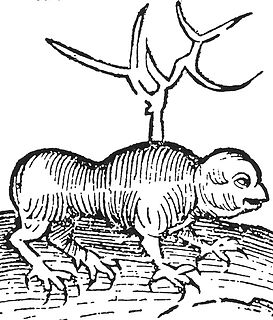
The antlions are a group of about 2,000 species of insect in the family Myrmeleontidae, known for the fiercely predatory habits of their larvae, which in many species dig pits to trap passing ants or other prey. The adult insects are less well known, due to their relatively short lifespans compared to the larvae. Adults mostly fly at dusk or after dark, and may be mistakenly identified as dragonflies or damselflies; they are sometimes known as antlion lacewings. In North America, the larvae are sometimes referred to as doodlebugs because of the strange marks they leave in the sand.

Euroleon nostras is a species of antlion found over most of Europe. The scientific name can be translated as "our European [ant] lion". Adults resemble dragonflies or damselflies and may reach up to 30 mm (1.2 in) long, with a wingspan of 70 mm (2.8 in). The larvae prey on ants and other small creatures and require dry sandy soil in which to dig their pitfall traps.

The Brachyceran family Vermileonidae is a small family of uncertain affinities and unusual biology. It includes fewer than 80 described species, most of them rare and with restricted distribution, in 10 genera. Historically the vermileonids had been regarded as belonging to the family Rhagionidae, possibly in a subfamily Vermileoninae. Their biology and morphology is so markedly distinct from the main Rhagionidae sensu stricto however, that the placement as a separate family has been widely accepted.

The Neuropterida are a clade, sometimes placed at superorder level, of holometabolous insects with over 5,700 described species, containing the orders Neuroptera, Megaloptera, and Raphidioptera (snakeflies).

The Myrmecoleon or Ant-lion is a fantastical animal from classical times, possibly derived from an error in the Septuagint version of the book of Job, reappearing in the Greek Christian Physiologus of the 3rd or 4th century A.D.
In the 10th edition of Systema Naturae, Carl Linnaeus classified the arthropods, including insects, arachnids and crustaceans, among his class "Insecta". Insects with net-veined wings were brought together under the name Neuroptera.

Blatačko Lake is a natural lake 21 kilometers to the north-east of Konjic, in Konjic municipality, Bosnia and Herzegovina. The lake is a central feature of the natural & cultural-historical ensemble - cultural landscape - designated as National Monument of Bosnia and Herzegovina.

Myrmeleon is an ant-lion genus in the subfamily Myrmeleontinae. Species in the genus feeds on ants and some are themselves prey for the dune cricket Schizodactylus inexspectatus.
Antlion is a name applied to a group of about 2,000 species of insects in the family Myrmeleontidae.

Lachlathetes gigas is a species of antlions in the subfamily Palparinae. It is native to Gabon, Guinea and Sierra Leone. The species was named by Dalman in 1823, based on an insect figured by Dru Drury as a variety of Myrmeleon libelluloides.

Distoleon tetragrammicus is a species of antlion in the subfamily Myrmeleontinae.

Dendroleon pantherinus is a species of neuropteran insects of the antlions (Myrmeleontidae) family.
Myrmeleontini is an antlion tribe in the subfamily Myrmeleontinae.

Haplaxius pictifrons is a species of cixiid planthopper in the family Cixiidae.
Myrmeleon mexicanus is a species of antlion in the family Myrmeleontidae. It is found in Central America and North America.

Myrmeleon immaculatus is a species of pit-trapping antlion in the family Myrmeleontidae. It is found in Central America and North America and is a particularly common species in the eastern United States.
Myrmeleon mobilis is a species of antlion in the family Myrmeleontidae. It is found in North America.
Myrmeleon exitialis is a species of antlion in the family Myrmeleontidae. It is found in North America.
Glenostictia pictifrons is a species of sand wasp in the family Crabronidae. It is found in North America.











